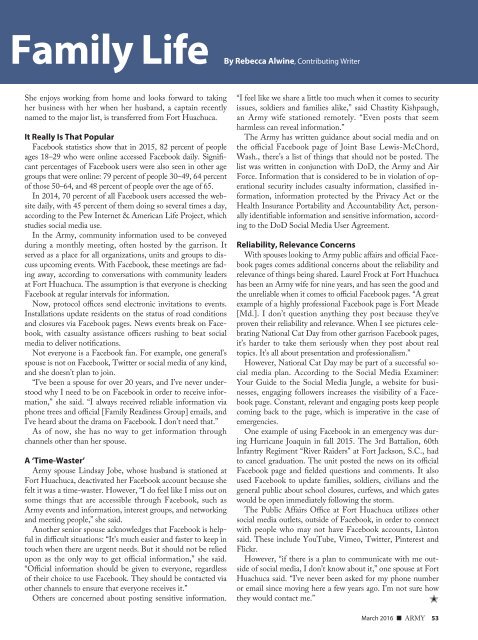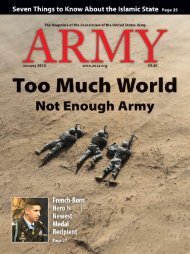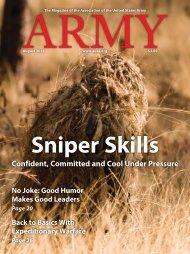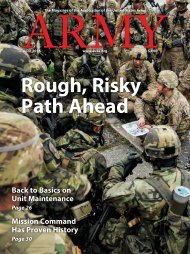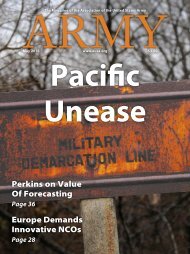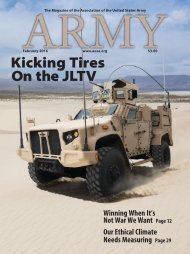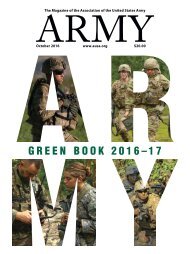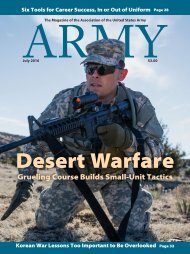Army - Stimulating Simulation
Create successful ePaper yourself
Turn your PDF publications into a flip-book with our unique Google optimized e-Paper software.
Family Life By<br />
Rebecca Alwine, Contributing Writer<br />
She enjoys working from home and looks forward to taking<br />
her business with her when her husband, a captain recently<br />
named to the major list, is transferred from Fort Huachuca.<br />
It Really Is That Popular<br />
Facebook statistics show that in 2015, 82 percent of people<br />
ages 18–29 who were online accessed Facebook daily. Significant<br />
percentages of Facebook users were also seen in other age<br />
groups that were online: 79 percent of people 30–49, 64 percent<br />
of those 50–64, and 48 percent of people over the age of 65.<br />
In 2014, 70 percent of all Facebook users accessed the website<br />
daily, with 45 percent of them doing so several times a day,<br />
according to the Pew Internet & American Life Project, which<br />
studies social media use.<br />
In the <strong>Army</strong>, community information used to be conveyed<br />
during a monthly meeting, often hosted by the garrison. It<br />
served as a place for all organizations, units and groups to discuss<br />
upcoming events. With Facebook, these meetings are fading<br />
away, according to conversations with community leaders<br />
at Fort Huachuca. The assumption is that everyone is checking<br />
Facebook at regular intervals for information.<br />
Now, protocol offices send electronic invitations to events.<br />
Installations update residents on the status of road conditions<br />
and closures via Facebook pages. News events break on Facebook,<br />
with casualty assistance officers rushing to beat social<br />
media to deliver notifications.<br />
Not everyone is a Facebook fan. For example, one general’s<br />
spouse is not on Facebook, Twitter or social media of any kind,<br />
and she doesn’t plan to join.<br />
“I’ve been a spouse for over 20 years, and I’ve never understood<br />
why I need to be on Facebook in order to receive information,”<br />
she said. “I always received reliable information via<br />
phone trees and official [Family Readiness Group] emails, and<br />
I’ve heard about the drama on Facebook. I don’t need that.”<br />
As of now, she has no way to get information through<br />
channels other than her spouse.<br />
A ‘Time-Waster’<br />
<strong>Army</strong> spouse Lindsay Jobe, whose husband is stationed at<br />
Fort Huachuca, deactivated her Facebook account because she<br />
felt it was a time-waster. However, “I do feel like I miss out on<br />
some things that are accessible through Facebook, such as<br />
<strong>Army</strong> events and information, interest groups, and networking<br />
and meeting people,” she said.<br />
Another senior spouse acknowledges that Facebook is helpful<br />
in difficult situations: “It’s much easier and faster to keep in<br />
touch when there are urgent needs. But it should not be relied<br />
upon as the only way to get official information,” she said.<br />
“Official information should be given to everyone, regardless<br />
of their choice to use Facebook. They should be contacted via<br />
other channels to ensure that everyone receives it.”<br />
Others are concerned about posting sensitive information.<br />
“I feel like we share a little too much when it comes to security<br />
issues, soldiers and families alike,” said Chastity Kishpaugh,<br />
an <strong>Army</strong> wife stationed remotely. “Even posts that seem<br />
harmless can reveal information.”<br />
The <strong>Army</strong> has written guidance about social media and on<br />
the official Facebook page of Joint Base Lewis-McChord,<br />
Wash., there’s a list of things that should not be posted. The<br />
list was written in conjunction with DoD, the <strong>Army</strong> and Air<br />
Force. Information that is considered to be in violation of operational<br />
security includes casualty information, classified information,<br />
information protected by the Privacy Act or the<br />
Health Insurance Portability and Accountability Act, personally<br />
identifiable information and sensitive information, according<br />
to the DoD Social Media User Agreement.<br />
Reliability, Relevance Concerns<br />
With spouses looking to <strong>Army</strong> public affairs and official Facebook<br />
pages comes additional concerns about the reliability and<br />
relevance of things being shared. Laurel Frock at Fort Huachuca<br />
has been an <strong>Army</strong> wife for nine years, and has seen the good and<br />
the unreliable when it comes to official Facebook pages. “A great<br />
example of a highly professional Facebook page is Fort Meade<br />
[Md.]. I don’t question anything they post because they’ve<br />
proven their reliability and relevance. When I see pictures celebrating<br />
National Cat Day from other garrison Facebook pages,<br />
it’s harder to take them seriously when they post about real<br />
topics. It’s all about presentation and professionalism.”<br />
However, National Cat Day may be part of a successful social<br />
media plan. According to the Social Media Examiner:<br />
Your Guide to the Social Media Jungle, a website for businesses,<br />
engaging followers increases the visibility of a Facebook<br />
page. Constant, relevant and engaging posts keep people<br />
coming back to the page, which is imperative in the case of<br />
emergencies.<br />
One example of using Facebook in an emergency was during<br />
Hurricane Joaquin in fall 2015. The 3rd Battalion, 60th<br />
Infantry Regiment “River Raiders” at Fort Jackson, S.C., had<br />
to cancel graduation. The unit posted the news on its official<br />
Facebook page and fielded questions and comments. It also<br />
used Facebook to update families, soldiers, civilians and the<br />
general public about school closures, curfews, and which gates<br />
would be open immediately following the storm.<br />
The Public Affairs Office at Fort Huachuca utilizes other<br />
social media outlets, outside of Facebook, in order to connect<br />
with people who may not have Facebook accounts, Linton<br />
said. These include YouTube, Vimeo, Twitter, Pinterest and<br />
Flickr.<br />
However, “if there is a plan to communicate with me outside<br />
of social media, I don’t know about it,” one spouse at Fort<br />
Huachuca said. “I’ve never been asked for my phone number<br />
or email since moving here a few years ago. I’m not sure how<br />
they would contact me.”<br />
✭<br />
March 2016 ■ ARMY 53


